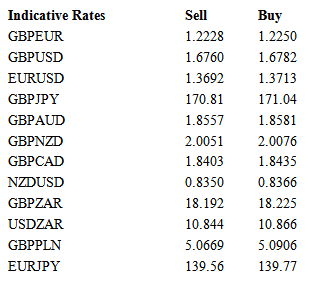A quieter Monday than usual lies ahead of us as a result of the US’s President’s Day bank holiday but the Asian session has had more than enough news for the trading day.
The Japanese yen has been one of the best performing currencies this year, benefiting from the emerging market wobble and the subsequent desire for safety into a haven investment while belief around the Japanese economy and recovery has increased. Last night’s GDP announcement however has shown an economy growing at 1.0% annualised in Q4, much lower than the 2.8% that the market had expected. The main laggard was trade data as imports – energy in particular / rose dramatically while exports, the lifeblood of Japanese company expansion, were poor. Capital spending, investment and consumer spending were strong but all come before an increase in the nation’s sales tax in April that will act as a major suppressant to growth. I would expect to see further pressure on the Abe government and the Bank of Japan to loosen monetary policy in the coming months to bring about some better news. Japan is growing as quickly, or as slowly, as the French economy it has been shown and there is no doubt that the French would like some looser policy.
French, German and Italian GDP figures were released on Friday with all beating estimates. France’s economy expanded by 0.3% on the quarter and 0.8% compared to a year earlier. The key will be maintaining this through Q1 and whether the deflationary pressures that the wider Eurozone is experiencing start to hammer consumption and raise debt burdens. German GDP grew by 0.4% on the quarter and 1.3% on the year as a demand for exports trumped weak domestic demand.
Unfortunately for those of us who are looking for a reaction from the European Central Bank in order to get a real recovery going in the Eurozone, these releases are only likely to stay their hand. Eurozone GDP was shown to have expanded by 0.3% – above the 0.2% estimate – but inflation remains at 0.7%. Which one will govern the ECB’s decision making?
Italian politics have rumbled on throughout the weekend as Matteo Renzi looks to form a new government having ousted Enrico Letta on Friday. Renzi will meet President Napolitano this morning and look to be take the Prime Ministership as a result. Hopefully this will put to rest this episode of infighting although it is good to have an Italian political epsiode that doesn’t involve the perma-tanned ridiculousness of Silvio Berlusconi. Moody’s upgraded the outlook on the country’s credit rating on Friday from negative to stable.
Sterling has cracked higher once again overnight with GBPUSD looking at the highest level since November 2009 and GBPEUR at a new 12 month top. Carney’s appaerance on the BBC’s Andrew Marr show is being cited as a catalyst despite the Governor’s insistence that real wages will be used as a contributing factor in rate increase decisions. “The path of monetary policy, the path of interest rates is going to be calibrated very carefully to ensure that only when we see sustainable growth in jobs, in incomes and in spending, will we make adjustments,” he said.
He also stated that the government’s ‘Help to Buy’ scheme was not a contributing factor in the recent increases in home prices. Overnight, Rightmove, a property website, reported that house prices were 6.9% higher on average nationally than this time last year.

